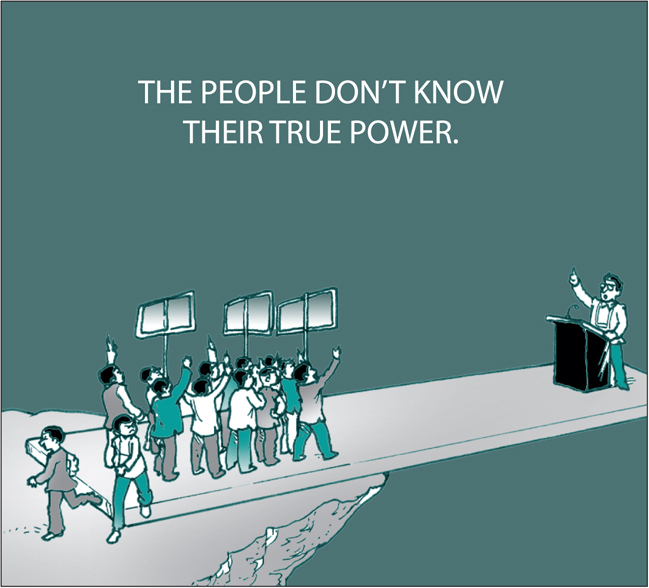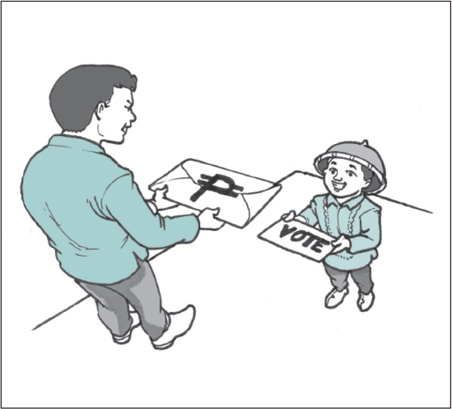Module
1 The Concepts of Politics and Governance
In this module, you will be able to:
Defining Politics
“Man is by nature a political animal.”
– Aristotle, Politics
(Father of Political Science)
Why did the Father of Political Science utter such a statement? Why did he say that man is a “political animal” and what do you think did he mean by this?
The inclination and interest of people toward anything political is based on the fact that individuals are inherently social. Unlike other species, humans rely on social interactions to survive. Politics is a byproduct of human interactions in society.
Heywood (2013) defined politics as an activity that involves the interaction of people, whose relationship is characterized by conflict and cooperation, and who come together to solve such disagreements through binding solutions. However, politics cannot be considered a “one-size-fits-all,” “straight jacket” in seeking solutions to social ills. There are disagreements that remain as such.
Big Idea
The study of politics involves two levels of human interactions within a community. Politics is experienced through personal relationships with the family, friends, and school. It is also evident when the government administers social policies to achieve social order among individual interactions.
The study of politics concerns the life of every individual in the community. The individual is affected by policies and rules created and implemented by the government. He or she exercises power in forming relationships with the government and other people, and also in making decisions in life. The value of politics is embedded in the way the individual conducts his or her daily life.
What Have I Learned So Far?
How does an individual manifest politics when he or she interacts with others?
So, what makes social interaction a political one? Any form of social interaction that involves the art of government, public affairs, compromise and consensus, or power and distribution of resources is political. This then gives you the different views on politics, as provided in the following table.
Table 1.1 The Different Views on Politics
| Views on Politics: Politics as… | Description of Politics |
| “art of government” | Politics concerns the affairs of the state. It focuses on the personnel and machinery of the government. |
| “public affairs” | Politics is the conduct and management of public interest and, therefore, political affairs. |
| “compromise and consensus” | Politics attempts to resolve conflict through discussion, compromise, bargain, and consensus, wherein people arrive at a binding decision. |
| “power and the distribution of resources” | Politics involves the exercise of authority in the production, distribution, and use of resources. This describes who gets what and under what circumstances. |
Source: Heywood 2013
Given the views on politics, one may think that politics only involves the state or the government. It must be noted, however, that human beings relate to each other not only in formal structures but also in collective arrangements such as families, religions, peer groups, or cultures. Power is also exercised in these types of relationships, making them political as well. For instance, who decides on specific familial matters is a venue by which authority is manifested. In religious organizations, the existence of authority is manifested as well in the presence of religious leaders vis-à-vis the followers. Hence, politics becomes a personal issue as well.
Study the following pictures. How do you think is politics manifested, characterized, or symbolized in each of these illustrations? Share your thoughts with the class.

Illustration 1
Adapted from: http://militantlibertarian.org/wp-content/uploads/2012/12/politicalpower.jpg

Illustration 2

Illustration 3

Illustration 4
Reflect Upon
How does the exercise of power affect the relationships within the family, with peer groups, in the school community, or with the people of authority?
What Have I Learned So Far?
Give at least five examples of social interactions, and elaborate how each can be political.
Beyond Walls 1.1 Apply It in Real Life
You are a political scientist working for an international organization whose major goal is to generate commitment among citizens to participate in governance by exercising the right to vote during elections. You have been tasked by the organization’s president to submit a research output that will discuss the factors and reasons considered by at least 15 individuals from your barangay on whether to vote or not during an election. Specifically, you have been asked to craft interview questions that will identify perspectives and orientation toward voting and to make an infographic that will summarize the answers of the respondents.
Guidelines for the interview:
1. Ask questions that are relevant and easy to understand by ordinary individuals. To do this, you may craft appealing and inviting questions for the interview. For instance, the question “What do you think of elections?” may ignite a good conversation.
2.Ask questions that are brief and direct to the point. It may be helpful to translate guide questions into the local language of the participants.
3.Ask one question at a time. Question structure should not be complicated with many concepts or ideas to facilitate easy understanding.
4.You may record the interview or take down notes, but for ethical purposes, ask permission from the respondents first.
Format for the interview guide:
| Questions to Ask | Answer of the Participant |
Guidelines for the infographics:
1.Prepare the infographic output that will summarize the responses of the participants. Identify the main objective of your research using short phrase(s).
2.Use creative illustrations and designs that can easily attract the attention of your audience. However, ensure that designs do not overpower the ideas and thoughts presented.
3.Visit https://www.visme.co/ for some tips and relevant ideas to present your infographic.
Your output will be evaluated based on content, logical presentation of information, and attractiveness of the infographic to the viewers.
Reflect Upon
In relation to the research activity that you did, characterize the behavior of individuals who participate in the political process?
What Is a Government?
Political science is a social science discipline that explains the state and the government. The state is a political community that involves four important elements, namely, people, territory, sovereignty, and government. The state, while it is considered an abstract entity for it has no existence as a material object, enjoys permanence, is not confined to a particular space, and is not embodied in any person or collection of persons (Kukathas 2008).
Big Idea
Governance is the government’s performance of mandates and functions that is subjected to citizens’ participation and private sector engagement in public affairs.
The government is an instrument of the state through which the will of the people is expressed, carried out, and formulated. Thus, the government serves as the bridge that connects the people to the state. The terms state and government are commonly used interchangeably, but in strict political science terms, they definitely have two different meanings.
At present, the concepts of government and governance are often used with confusion to a certain extent. As an institution, it is the government which concretizes the policies and addresses the problems of the state. On the other hand, good governance arises when the government involves the people in its agenda and in the process of policy making. The extent, therefore, to which democratic participation is encouraged determines whether or not governance exists. Governance may also mean how well the government performs its functions (e.g., delivery of basic services).
Big Idea
Governance is an innovative and ideal product of reforming modern states. It requires the interaction among the government, civic organizations, and citizens in managing the public arena. The government should not be left alone in assuring the achievement of human welfare.
Extend Your Knowledge
The World Bank, an international governmental organization, presents a comprehensive and holistic approach to governance. Visit http://www.info.worldbank.org/governance/wgi/index.aspx#home to know how the World Bank looks at good governance.
What Have I Learned So Far?
Explain the importance of governance in your own words.
The Study of Politics
So how do political scientists understand the political world? How does it look from the perspective of political scientists? There are several ways by which politics can be studied. Political science is an exciting discipline because it embraces an array of theoretical and methodological perspectives and a variety of analytic frameworks. In his book, Heywood (2013) summed up these major schools of thought in political science.
Big Idea
A political reality cannot be understood from a single perspective. An expert of politics produces scientific and objective perspectives using varied analytical tools.
The philosophical tradition, otherwise known as political philosophy, is regarded as the traditional approach to politics. The Greek philosophers, Plato and Aristotle, are usually associated with this tradition as they asked what “should” or “ought” instead of what “is.” This tradition underscored the analytical study of doctrines that have become the major focus of political thought.
Politics can also be studied through empirical tradition. Political scientists who advocate this approach believed that any account of political reality must be impartial and should be tested through observations of reality. Those who work in this tradition therefore seek to analyze and explain, and not to offer recommendations, as in the philosophical tradition.
Mainstream political analysis has also been dominated by the scientific tradition. This tradition promotes objective and quantifiable ways of studying politics. The scientific tradition was further pushed with the rise of behavioralism, or the belief that social theories should arise from observation and quantifiable data.
Recent theoretical approaches contribute in widening the perspective of studying political science. Among these include rational choice theory, new institutionalism, and critical theory, which includes feminism, Marxism, and other postpositivist and postmodernist approaches. Unlike behavioralism, postpositivism is an approach that emphasizes how people conceive or “construct” the political world. Make a research on these recent approaches and be ready to present in class your ideas about their main arguments or premises.
Reflect Upon
Should the study of politics, understanding of public affairs, and reasoning for political issues be objective? How do values, subjectivity, and personal belief influence one’s perspective toward the world of politics?
Extend Your Knowledge
The following materials offer a very good introduction to the study of political science.
Essential Learning
You have learned that politics is characterized by an interaction between individuals whose relationship is characterized by conflict and cooperation. Politics also involves the presence of binding solutions that will solve such differences, although politics is no utopian solution. A particular form of social interaction could be considered political if it involves relationships that have something to do with the art of governance, public affairs, compromise and consensus, and power relations, which all fall within political research. The ability to determine what is political is important in researching about or studying politics. The use of particular approaches in political science—whether the scientific, philosophical, or empirical ones—is crucial in understanding what politics entails.